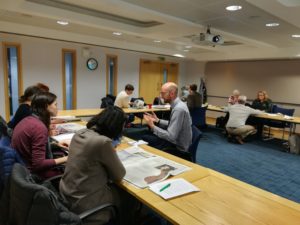In our latest blog, Shonagh McEwan, Knowledge Exchange Adviser, shares key tips from the recent Opinion Editorial (OpEd) writing workshop for academics.
Researchers are often asked, even expected, to write for non-expert audiences. At this workshop, participants learned how to write short pieces of commentary for the media.
Develop your pitch
Edd McCracken, Media and PR Manager for the College of Arts Humanities and Social Sciences, began by setting out how the Press Office supports researchers.
There is a growing demand for opinion pieces and the media needs academic experts. Edd helps connect academics with journalists and vice-versa. Crucially, Edd can help you develop your ‘pitch’. This is a short paragraph that states three main things: 1) what you would say in the opinion piece 2) why this piece of writing should go to the media now and 3) why you are the expert.
This pitch might be developed with Edd after a journalist has contacted the Press Office, or you can get in touch with the him with an idea for an OpEd on a particular issue. Hopefully, with Edd’s help, as well as his ability to persuade a suitable media outlet take the ‘pitch’, the OpEd piece is commissioned and you write it!

Don’t be shy and keep it brief!
Next up, we had Nick Bibby giving top tips on OpEd writing. Nick works for the School of Social and Political Science as a Press and Media Officer, and, with a background in journalism, he knows the tricks of the trade. Nick encouraged participants to realise that newspapers are looking for academic authority around your broad area of expertise. His advice: “Don’t shy away from writing for the media because the topic is not EXACTLY aligned to the EXACT research that you are working on right now! Don’t be shy!”
Nick pointed out that OpEd writing requires academics to break away from the norms of published peer review writing styles. In this kind of writing, you are commenting on something topical, drawing on your broad area of expertise.
Here are Nick’s top tips:
- Hang what you know onto something in the news now, and go for it!
- Get straight into the action – be brief, one key point/theme.
- Respect word limits and deadlines from the journalists – you won’t get asked again if you don’t understand that 400 words with a deadline of 2 hours is absolute.
- The public trust academic experts. The public is genuinely interested in ideas, discussion and analysis. Embrace the face that, as a scholar, you can provide that!
Living the dream – getting published in the media
James Eglinton, a lecturer from the School of Divinity, then gave us a personal insight into OpEd writing as an academic. James said he dreamed of being a journalist when younger, but instead fell in love with theology! As an academic, he finds OpEd writing is a valuable way to enter the public medium. James said: “The public won’t read your journal papers, but they will read and be influenced by opinion pieces”. He noted that his specific area of research is late Modern Calvinism in the Netherlands, but his OpEd writing is broader, providing a more nuanced perspective on religion in public life. A key message was that his OpEd writing opens up a tangible dialogue with a wider audience, including greater opportunity for knowledge exchange.
James’s positive experience with OpEd writing didn’t just happen, it was a process. He had previously taken part in MediaTalent, the University’s award-winning media training, but only decided to ‘pitch’ for his first OpEd piece when the media and politicians, especially Tim Farron, debated gay sex and sin. James realised how bad journalists and politicians were at discussing the issues, and so he entered the debate with an opinion piece published in The Times. His piece lent a new perspective to the public conversation on this subject. As a first step, James contacted Edd with his idea. He developed a short pitch for Edd to take to select media outlets and then worked closely with him on the piece, to a four hour deadline. Since then, James has honed his OpEd writing skills and now writes OpEd pieces that are regularly published.
James emphasised that his published OpEd pieces added a positive dimension to his teaching. Many of his students told him that they had read his OpEd writing (sometimes before, or even in preference to, his journal articles!).
Academics need a caveat perhaps, and so James gave us his: “OpEd writing is fun, it’s great putting ideas out there into public debate and challenging people to think BUT you never get to write the headline or subheading for your commentary; editors take control of this”. This means that most of the negative publicity James had is from headings he didn’t write! And most of the negative comments have come from reactions to a heading, rather than the actual content of his writing. James’s tip is to ignore these types of comments, or better still, simply don’t read the comments on your OpEds!
Go for it!
The workshop finished with an interactive session where participants read through newspapers, identified an issue they could hook their expertise on to, and drafted a one minute pitch to a newspaper editor… thankfully, Edd, Nick and James were on hand to help!
So be inspired, write for the media. Your expertise as an academic is much needed and valued!
Shonagh McEwan is Knowledge Exchange Adviser. She works in the Knowledge Exchange Team in the College of Arts, Humanities and Social Sciences.
Links
Workshop details and handout (EASE login required)




Great article Shonagh, thanks for posting. I particularly like Nick’s advice on not shying away if it’s not the exact bit of research in your exact field… comes up time and again.